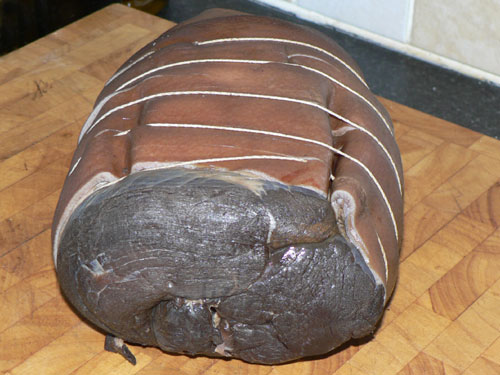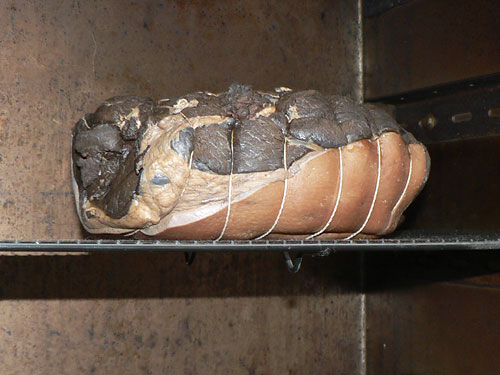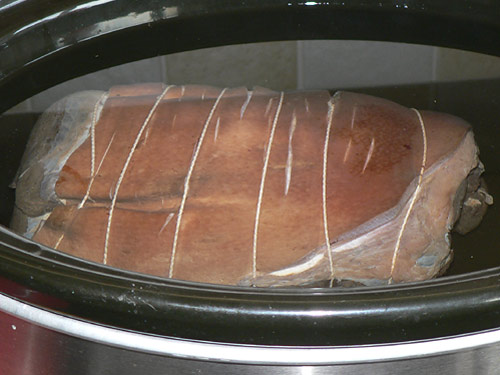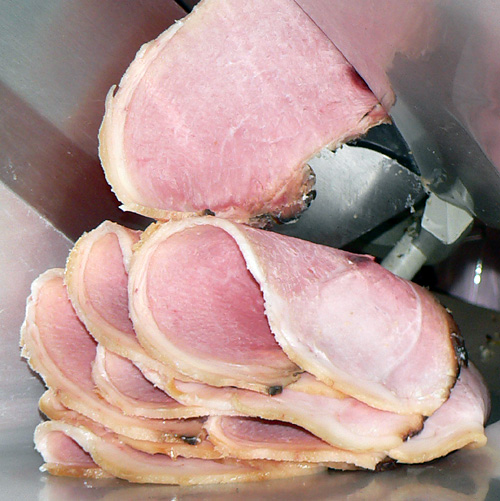Originally posted in 2009...
What springs to mind if I mention Emmet? Is it a Cornish tourist, or maybe the neighbour of Hyacinth Bouquet in the famous sitcom? Well, to any foodie or meat curer it won’t be either; it’ll be the makers of the famous Suffolk Black Ham that used to hold Royal Warrant, Emmett’s of Peasenhall. They’ve been making ham for over 150 years. Whilst there are other black hams, including the famous Bradenham from Wiltshire, Shropshire Black Ham, and a less well-known one from Derbyshire, Emmett’s seems to have become the one people talk about. It’s featured in the press and used to be rolled out on Delia Smith’s TV programmes at Christmas.
Now, before anyone else does, I’d like to point out that I’m not trying to produce a clone of Emmett’s ham and will not be using their method as far as I can ascertain. My cure will produce a ham ‘in the spirit’ of a traditional Suffolk Black Ham using a simplified curing process.
The ham gets its colour from Muscodavo sugar, Molasses and Dark Porter or Stout. In Emmet’s case, it’s from Nethergate brewery’s Old Growler – a 5% ABV porter. I have a friend in the same city as the Nethergate brewery so I made the ham with it. Another porter or stout could be substituted – I was told by the owner of Emmetts that they used to use Guinness.
Black Ham
Beer (Porter or Stout) 601gm
Water 145gm
Salt 100 gm
Molasses (Muscodavo) sugar 45gm
Molasses 100gm
Cure #2 gm 9.4gm
Whole Spices
Black 6 Peppercorns
Coriander 6 Seeds
Juniper 4 Berries
Cloves 2 Cloves
All the ingredients with the exception of the cure are placed into a pan and brought to a rolling boil for 2 – 3 minutes. They are then allowed to cool. The cure is added and mixed well in to ensure that it’s fully dissolved. It’s then ready for use.
Important: This recipe must be used in a ratio of 2 parts meat to 1 part brine. The cure above is for meat weighing 2kg. For all other weights of meat please use the calculator below. The meat should be cured for 10 days per kilo or pro-rata. This cure is not recommended for meat above 3.5kg in weight, without adaption.
After 10 days per kg (pro-rata) curing the ham is rinsed in cold water and put in the fridge to wait for the surface to dry out before it is smoked.

The Black Ham’s was smoked. I was going to smoke it for 72 hours, but a rethink, because of its size and the weather, has meant that it was been in oak smoke for a total of about 28 hours.

I’ll give it a few days in the fridge, loosely wrapped, to dry further and to allow the cure to fully equalise. That is, to allow the cure to spread evenly throughout the meat.
I cooked the ham simply in my slow cooker in plain water at 80°C – the ‘keep warm’ setting on my cooker once it has come up to temperature. I changed the water after about 30 minutes to avoid it being salty, although with hindsight this wasn’t necessary.

The ham was cooked until it reached an internal temperature of 72°C and then glazed with a mixture of brown sugar, French mustard and apricot jam and put into a hot oven for about 20 minutes.

So what of the end result? Well, I was amazed by the weight loss, particularly given the small amount of skin that needed removing. The total loss was some 45% and amazingly, it actually lost weight during the brining, somewhat unusual to say the least.
The meat is drier than my normal hams, something that it has in common with the Emmetts Ham that was the starting point of this recipe. The meat is also very firm, probably due to the combined length of the smoking and drying period for what is a small piece of meat. I doubt that a larger piece of meat, even matured for a longer period of time, would have the same problem.
What of the taste? Well, the glaze I used does absolutely nothing for it! The smoking is virtually undetectable, next time I’d either smoke it for a lot longer or not bother at all. The outer crust of the meat, where it was unprotected by fat has very much a molasses taste with a hint of the beer, so it’s obviously better done (as Emmetts do) with whole legs. That said, the rest of the meat is very nice, neither too salty nor too sweet, neither too spicy nor too bland.
The family’s verdict was mixed; mum loved it, she’s a real lover of drier styles of ham with good flavour, Dad was a bit non-committal but came back for another slice, but Emma my daughter didn’t like it at all.
What about next time? I’ll be happy enough to stick with the same basic recipe; maybe I’ll tinker with the molasses a little or replace the raw cane sugar with white granulated, or even up the spicing – maybe 10 – 20% more – I don’t know. But, fundamentally the recipe seems sound. What I do know is that I’ll use a larger piece of meat of better quality than the cheap supermarket product I used for this – one with a good covering of fat and skin. I know I’d either smoke them for longer or in heavier smoke or not at all; I’m not sure that it really needs the additional smoke flavour. All-in-all, given that this type of ham is not really my ‘cup of tea’ (I’ve made it ‘cos mum loves this type) I’m pleased with the results.
There is a calculator for this ham:
Black Ham Calculator